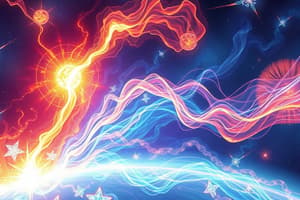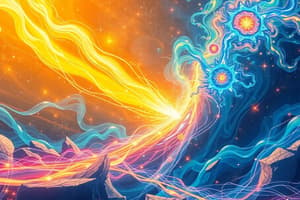Podcast
Questions and Answers
What is the formal definition of energy in physics?
What is the formal definition of energy in physics?
- Energy is the power derived from the utilization of physical resources
- Energy is the ability to cause change
- Energy is the capacity to do work (correct)
- Energy is the potential of a physical system to perform work
Where does energy for body functions come from?
Where does energy for body functions come from?
- Sunlight
- Food (correct)
- Air
- Water
What type of energy makes movement possible?
What type of energy makes movement possible?
- Thermal energy
- Potential energy
- Chemical energy
- Kinetic energy (correct)
Which of the following is a form of energy?
Which of the following is a form of energy?
What is the global context of future energy sources discussed in the chapter?
What is the global context of future energy sources discussed in the chapter?
What is the unit of measurement for energy in the International System of Units (SI)?
What is the unit of measurement for energy in the International System of Units (SI)?
What does the law of conservation of energy state?
What does the law of conservation of energy state?
What type of energy is associated with chemical reactions?
What type of energy is associated with chemical reactions?
Which of the following is a form of energy carried by electromagnetic radiation?
Which of the following is a form of energy carried by electromagnetic radiation?
What type of energy is stored in a solid object?
What type of energy is stored in a solid object?
Flashcards are hidden until you start studying
Study Notes
Definition and Sources of Energy
- Energy is defined as the capacity to do work or produce change in a physical system.
- The body derives energy primarily from food sources such as carbohydrates, fats, and proteins, which release energy through metabolic processes.
Types of Energy
- Kinetic energy facilitates movement; it is the energy of an object in motion.
- Various forms of energy include thermal, chemical, electrical, nuclear, and mechanical energy, among others.
Future Energy Sources
- The global context emphasizes the need for sustainable and renewable energy sources to address environmental concerns and resource depletion.
- Discussions may include solar, wind, hydroelectric, and bioenergy as alternatives to fossil fuels.
Measurement and Concepts in Energy
- The unit of measurement for energy in the International System of Units (SI) is the joule (J).
- The law of conservation of energy dictates that energy cannot be created or destroyed, only transformed from one form to another.
Energy Types in Reactions and Radiation
- Chemical energy is related to the potential energy stored in the bonds of chemical compounds; it is released during chemical reactions.
- Electromagnetic energy is carried by electromagnetic radiation, examples include visible light, radio waves, and X-rays.
Energy Storage
- Potential energy is the energy stored in an object due to its position or condition, such as energy stored in a stretched spring or gravitational potential energy in elevated objects.
Studying That Suits You
Use AI to generate personalized quizzes and flashcards to suit your learning preferences.





